SEO
Free SEO Analysis
SEO Services
Content Marketing Services
Local SEO
Link Building Services
Specialized SEO Services
PPC
REPUTATION MANAGEMENT
Free Reputation Management Analysis
Reputation Management Services
Review Management Services
Specialized Reputation Management Services
CEO Reputation Management
Brand Enhancement
Business and Directory Listings
Comprehensive Reputation Management Audit
SOCIAL MEDIA
Free Social Media Analysis
Specialized Social Services
WEB DEVELOPMENT
Free Website Analysis
Web Design Services
Mobile Development Services
Website Maintenance Services
Specialized Development Services
MARKETING AUTOMATION
Free Marketing Automation Analysis
Specialized Marketing Automation Services
Comprehensive Marketing Automation
INDUSTRIES
ABOUT DMA
Digital Marketing
Digital Marketing News 01/18/2022 – 01/24/2022
Request a quote
Its Fast, Easy & Free
This week on latest digital marketing updates: Google Search Console will roll out a new desktop-specific page experience report, Google implements changes to recipe structured data, unconfirmed changes in Google search algorithms are observed, and the new Google Ads Experiments Page changes the way advertisers test and optimize campaigns.
Here are the latest news, trends, and updates in detail:
Google Search Console Introduces New Desktop Page Experience Report
The new report dedicated to evaluating page experience criteria for desktop versions of webpages rolling out on the Google Search Console.
Google is rolling out a new page experience ranking update to desktop search results starting February 2022. This new report can help you prepare for this upcoming launch.
Google announces on Twitter, "To support the upcoming rollout of page experience ranking to desktop, Search Console now has a dedicated desktop section in its Page Experience report to help site owners understand Google's 'good page experience' criteria."
The desktop report can be accessed from the Page Experience tab on the left sidebar menu in Google Search Console. It looks and functions almost similar to the mobile report, except for the Mobile Usability section for clear-cut reason.
Core Web Vitals metrics: Largest Contentful Paint (LCP), Cumulative Layout Shift (CLS), and First Input Delay (FID), and their corresponding thresholds and algorithm will also apply for desktop ranking.
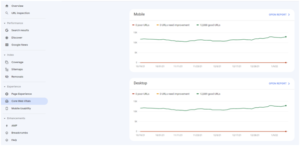
Image from Search Engine Journal
Google Updates Recipe Structured Data Guidance
Google's guidance on recipe structured data is updating to the latest requirements.
Recipe structured data, or recipe rich result, is the information that publishers communicate to search engines like Google to help better understand the content. This structured data allows Google to display content in engaging ways that give attention to recipes, called Recipe Enhancements. Two types of Recipe Enhancements include Guided Recipes, which allows Google Home and smart displays to guide users through a recipe, and Recipe host carousel, the list-like rich result that displays multiple cards from the same site.
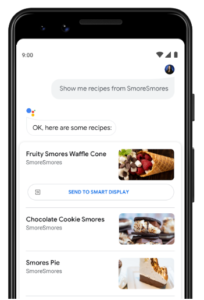
Guided recipe with the help of Google Assistant
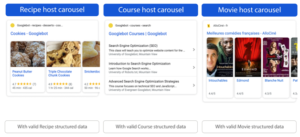
Sample recipe host carousel
A correct structured data is critical as it may cause a site to lose eligibility for being shown n Recipe Enhancements. It may also lead to subsequent loss of search engine traffic, which may domino to other sites that use the correct structured data.
The recipe structured data changes include the removal of the following wording, "You can use min and max as child elements to specify a range of time." From the cookTime property recommendation. From the prepTime property, the following wording was also removed "You can use min and max as child elements to specify a range of time."
Google now only supports exact time for both the cookTime and prepTime properties, removing the range time option for use. The update states, "Currently, the only supported method is an exact time; time ranges aren't supported. If you're currently specifying a time range and you'd like Google to better understand your time values for cook time and prep time, we recommend updating that value in your structured data to a single value (for example, "cookTime": "PT30M")."
In the changelog documentation, a third property has also changed:
"Removed guidance about specifying a range for the cookTime and prepTime properties in the Recipe documentation."
Without the range for cookTime and prepTime properties, totalTime property has also changed even without Google mentioning this change.
Many sites refer to structured data plugins. If you use a plugin with the time range, are one of them, you should update your plugin to the most recent version to make sure that your structured data is also up to date.
Unconfirmed Google Search Ranking Update is in the Foreseeable Future
Google tracking tools saw signs of another Google search ranking algorithm update last January 19th and 20th.
SEO industry chatter and data from tracking tools noticed some volatile movements from Google search ranking algorithm.
However, Google has not confirmed any search-related updates yet.
The chatter started with some discussions at WebmasterWorld starting on January 18. Early snippets from that thread include the following discussions:
User ichthyous states, "Very large increases in traffic across the board for the last two days...yesterday was up 30% and that included USA traffic. My ranking has barely budged though...gained back 4 top 3 terms, lost them all the next day. My top 3/10 ranking remains at less than half of one year ago. So if rank is not improving, then where is all the traffic suddenly coming from?
Also...a popular arts magazine just published an in-depth article about me and it has yet to be indexed 5 days later...nothing. The on-page tags are correct, and the site publishes a lot of very high quality editorial using freelance writers, but it does not get indexed or rank well when it does. It's mystifying to me..."
seomark shares, "Massive fluctuations again this morning. In our affiliate niche we have a lot of high DA newspaper and blog sites with 'Top 10 listings' outranking dedicated affiliate sites. The Herald, The Scotsman, The Denver Post, The Mercury News all appear. A few previously top 10 sites just been kicked into the long grass - pages 4 and 5. It's happened before and reverted pretty quickly. But there is no let up in the volatility which has been on going for weeks - since start of December."
On the other hand, redbar says, "I wonder how long this will last? Good traffic again Tuesday at 131.3% and so far today 87.0%. The sources, queries and paths are all normal but, as yet, not driving many new enquiries however this is not unusual. All my SERPs look normal."
Google tracking tools show the following:
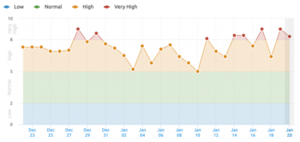
SEMRush
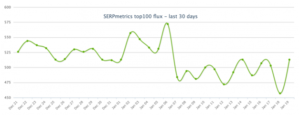
SERPMetrics
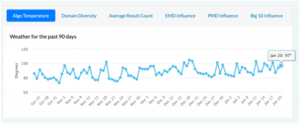
MozCast
Google Ads Experiments Page Lets You Test with Confidence
Avoiding implementation issues in ad campaigns is now easier with the ability to experiment prior to launching.
Data-driven testing is key to successful ad campaigns. And one of the best ways to do it in Google Ads is by running experiments. Fortunately with many advertisers, Google is rolling out the new Experiments page in Google Ads to help you create, manage, and optimize your testing.
Experiments page allows you to customize your campaign and see expected results without touching on your original campaigns. Instead of creating campaign drafts to test, you can select a campaign and create a custom experiment. This new Experiments page can help you monitor performance, and if you're happy with the results, you can apply changes to your original campaign with a single step.
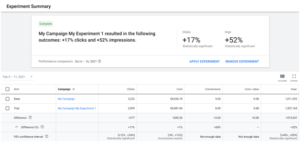
Advertisers can definitely reap the benefits of testing strategies with ease and convenience with this new update from Google Ads.
What you can do next
Review Google's new Core Web Vitals to see how you can improve your website to abide by these new search algorithm metrics.
If you are a food blog or a recipe website, update your recipe structured data plugin to ensure your site complies with the new changes in recipe structured data for Google search results.
Start using the Experiments page in your campaigns to make strategies and split testing faster and more convenient as you optimize your marketing efforts.
Elevate Your Marketing
How to Conduct a Digital Strategy Audit to Get Results
Auditing your digital strategy is the best way to find out what you're doing wrong and where you're performing well. To fix a problem or leverage opportunities, you need to have a solid understanding of both.
SEO Vs. PPC: How to Combine These Marketing Tactics for Better Results
Both SEO and PPC are search engine marketing tactics that drive traffic to your site. There's a benefit to both organic reach and spending some money on ads to catapult your business. Here's how you can combine the two.
How to Run a Successful PPC Campaign to Get More Sales
PPC is an excellent investment, but only when it's done correctly. You need to do it right the first time, so you don't waste time and resources. Taking out the guesswork is simple when you follow the steps we already use to launch campaigns for our clients effectively.
Have challenges in your business? We can help. Request a free quote today
Our Sales team